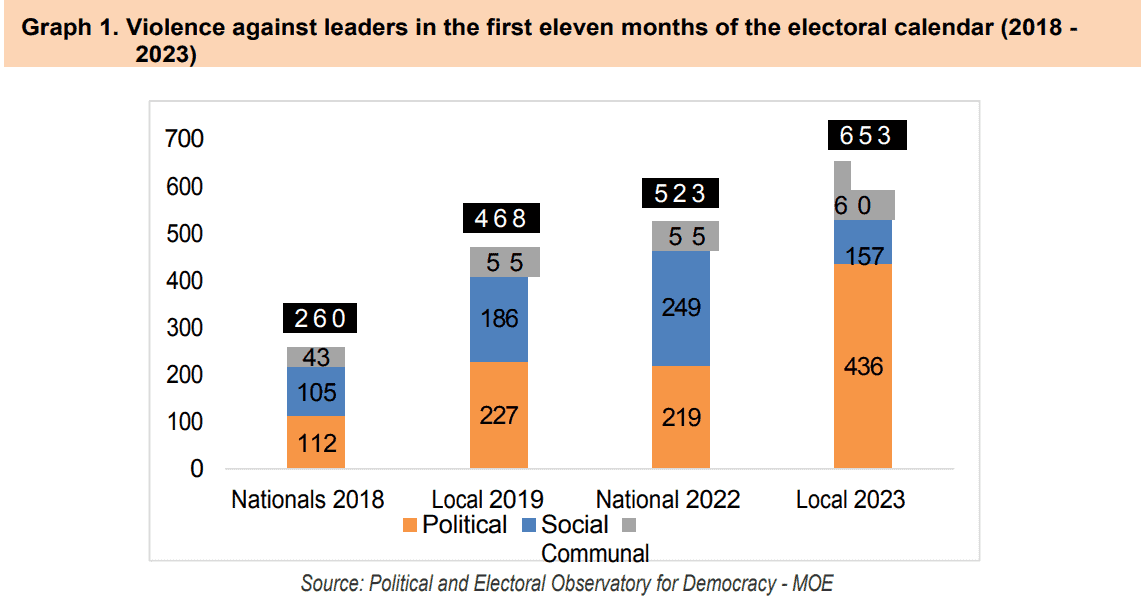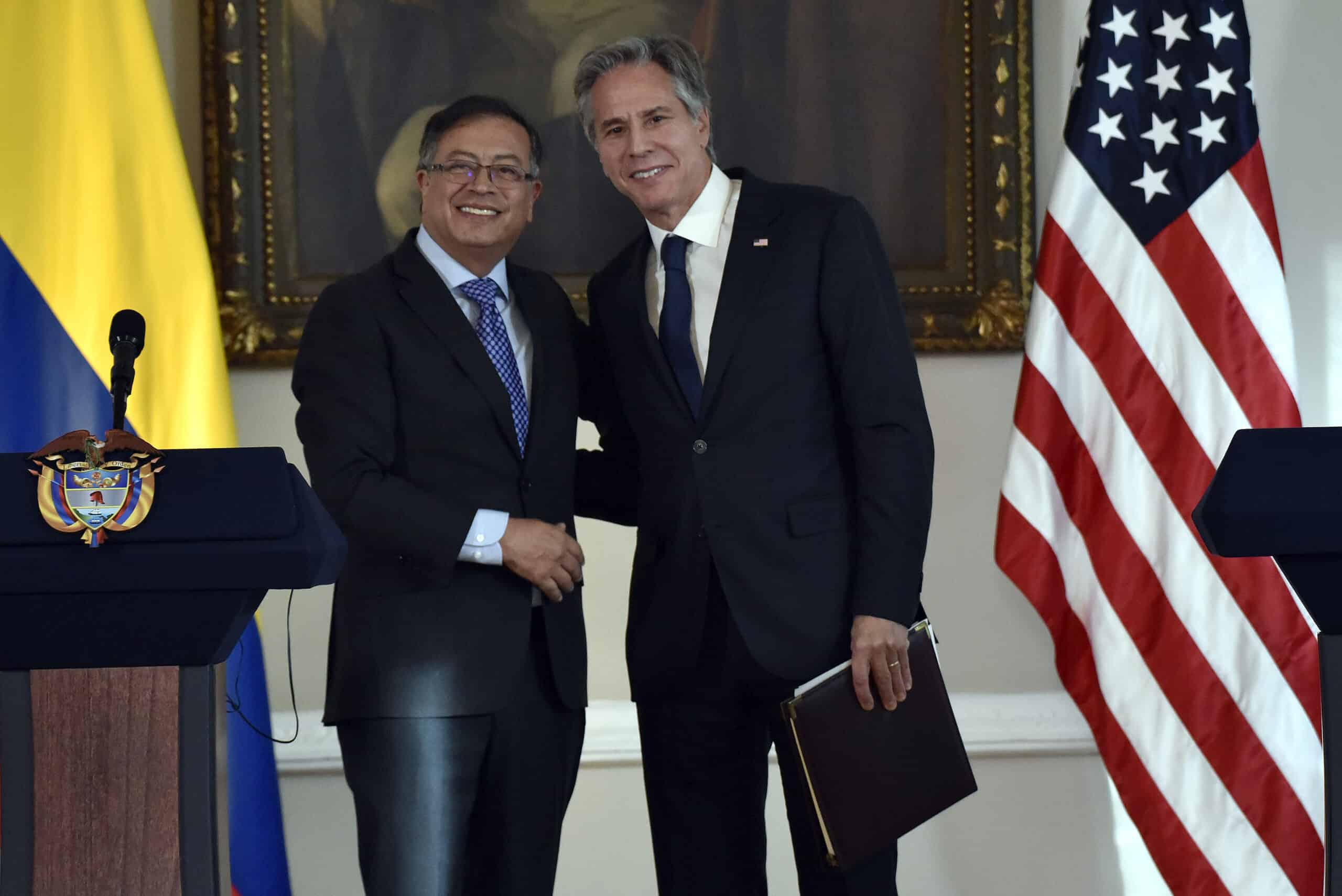(Photo by Horacio Villalobos Corbis/via Getty Images)
(Photo by Horacio Villalobos Corbis/via Getty Images)
On October 29, Colombians will head to the polls to vote in regional and local elections that US policymakers would do well to watch closely.
Increased concerns over security issues and the country’s humanitarian situation have created a contested political arena with reports saying that as many as 120, 000 candidates could be in the running. Colombians will elect 32 governors, 418 state officials who will make up the 32 departmental assemblies, 1,102 mayors, 12,072 municipal and city deputies, and 6,513 territorial authorities making up the Local Administration Boards. With so many seats up for grabs, these elections will serve as a referendum on President Gustavo Petro’s administration after a year in office.
The results could shed light on the political positioning of the Colombian electorate, Petro’s political allies, the outlook on the citizen security crisis, and offer insight for the international community on how regional peacebuilding and regional migration agendas will take shape.
A year into the Petro administration, violence, massacres, and humanitarian emergencies continue despite the government’s efforts to advance peace and security. Reporting from the Institute for Peace and Development Studies (INDEPAZ) and Temblores ONG finds that human rights defenders, signatories of the 2016 Peace Agreement, and local leaders are targets of violence, putting the construction of peace across territories in jeopardy.
Since Petro took office in August 2022, INDEPAZ recorded 89 massacres, as well as the killing of 167 social leaders and 36 signatories of the 2016 Peace Accords. By comparison, under the previous administration of President Iván Duque, the same organization recorded 88 massacres and the murder of 185 social leaders and 52 signatories of the 2016 Accords. While killings of former combatants and social leaders have dropped slightly under Petro, massacre rates have remained the same.
Violence against local leaders, especially those running for office is of particular concern. Fundación Ideas para la Paz indicated that 25 percent of leaders surveyed from 48 municipalities reported that they’d received threats- an increase from June 2023. Alarmingly, 84 percent of leaders deemed their municipalities as unsafe. In the run-up to the local elections, many candidates have been targeted, some being killed as a result of threats and intimidation tactics. Death threats aimed at leaders and their families, intimidating messages and calls sent to their phones, as well as threatening pamphlets signed by illegal armed groups that circulate in communities are all tactics used to deter electoral participation.

On July 28, Jorge Saúl Cruz Pardo, a union advocate who was running as a Creemos Party candidate for the council of Carmen de Chucurí, was killed in Santander, and in Tolima, Leandro Sánchez Reyes of the same party was killed days later. The Electoral Observation Mission (Misión de Observación Electoral, MOE) reported that ahead of these elections, 653 violent acts were committed against social, communal, and political leaders. From October 2022 to May 2023, there was a 40 percent increase in violence against leaders compared to the last local elections that took place in 2019 under President Duque. Political leaders account for over half (436) of the violent incidents recorded by the MOE. Violence against candidates undermines democracy and the political participation process.
Sustained violence by illegal armed groups has undermined Petro’s efforts to advance peace and political reforms.The president’s ambitious Total Peace policy has yielded limited results in getting the majority of illegal armed actors operating throughout the territories to submit to dialogue.The progressive steps between the National Government and the National Liberation Army (ELN) Dialogues are a positive sign in building peace in Colombia. Including civil society in these dialogues with the installation of the National Participation Committee (CNP) will also serve as an important mechanism for regional participation and consultation in the negotiations in tandem with leaders elected this week. The October 16 establishment of a temporary bilateral ceasefire between the Colombian government and The Central General Staff (Estado Mayor Central, EMC), the governing body of some former Revolutionary Armed Forces of Colombia (FARC) dissident groups, is another positive development in building peace.
These regional and local elections will determine whether President Petro has the support he needs to implement his policies throughout the country. Several of his flagship policies including rooting out corruption and advancing peace and security will take time to fully materialize at the local level. Over a year into the Petro administration, a sense of both dissatisfaction and skepticism from governmental and public opposition over the president’s policies suggest that the upcoming elections could be a turning point. It is hard to deny that multiple scandals surrounding Petro and members of his administration resulted in reputational damage, which is likely to impact these elections. Notably, the investigation into his son, Nicolás Petro, over money laundering has garnered substantial criticism.
Petro’s police reform, and especially the reconfiguration of the Mobile Anti-Disturbance Unit (ESMAD) to the Unit for Dialogue and Maintenance of Order (UNDMO), has received substantial criticism from civil society organizations as being “cosmetic” and not addressing the root causes of police brutality. The Grita platform of Temblores ONG reported a total of 191 cases of police violence and 244 victims from August 7, 2022, to July 31, 2023. Homicide rates from the reformed ESMAD have also remained the same despite its reform.
Petro’s ambitious leftist government has had its share of criticism, however, the current economic state, and the severity of the humanitarian and security crisis (which arguably impacts a large portion of his voter base), all contribute to the overall dissatisfaction with the President. October 29 will define the many challenges Petro is set to face in the upcoming years, influencing his presidential legacy and political objectives.

U.S. Secretary of State Antony Blinken and Colombian President Gustavo Petro after meeting in Casa de Nariño, as part of Blinken’s visit to the country in October 2022.
U.S. policymakers may want to pay attention to these regional elections as the results will affect several key U.S. foreign policy objectives: promoting democracy, human rights, racial equity, migration policy, and peacebuilding efforts. Programs to better integrate migrants and refugees in Colombia will be determined by candidates running in cities that host the majority of regional migrants entering or passing through the country. This is especially important in the major hosting cities of Bogota, Cúcuta, Barranquilla, Bucaramanga, Cali, Medellin, and Necoclí. Fundación Ideas para la Paz (FIP)’s recent analysis of candidates running in these cities concluded that there are general programs proposed to address regional migration, however, the social cohesion across the country seems to be faltering as many find the topic of Venezuelan migration a point of contention. Officials who may win seats at the local level can impact the overall dynamics of migration in the region- something U.S. policymakers ought to observe.
Colombia is one of the U.S’s strongest allies in the region, and U.S. aid continues to support peace efforts across the country. The regional and local leadership defined by these elections could support the U.S. in monitoring the full implementation of the 2016 Accords, and finding solutions for integral peace as an accompanier to the Accord’s Ethnic Chapter. The positive developments under the Total Peace agenda so far should urge the U.S. to support the Petro administration in constructing comprehensive peace that takes into account the complexities the armed conflict has created in different regions.
This weekend, the process to elect regional and local leaders for 2024-2027 is a reminder of how grassroots and local participation are essential to maintaining strong democratic institutions and practices. Both the political violence against candidates and the escalating violence in communities violate Colombian’s right to safe political participation. The violation of political and civil participation is a threat to Colombian democracy. October 29 will determine the trajectory of the Petro administration, but also of the security crisis harming the civilian population, as well as the future of multiple, complex peace negotiations and processes in Colombia.